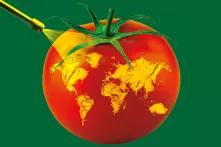The EU is the largest pesticide export market in the world, now investing more and more in countries of the Global South, where EU companies are allowed to export pesticides banned on their own due to their harmful effects on human health and the environment. A longstanding demand of international civil society calls for laws that effectively ban these toxic exports.

In beer and in honey, on fruit and on vegetables, on playgrounds’ grass, in urine and even in the air – traces of pesticides used in agriculture can be found everywhere. That pesticides deteriorate human health, biodiversity, water, and soil is not a new insight by any means. As early as 1962, biologist Rachel Carson published her globally acclaimed book “Silent Spring” in which she described the harmful effects of pesticide use. Her work has been groundbreaking for the environmental movement and led to the ban of highly toxic chemicals such as DDT.
But today, sixty years after Carson’s book was released, greater amounts of pesticides are being used worldwide than ever before despite stricter approval regulations – and voluntary as well as binding agreements on the handling of pesticides. The cultivation of genetically modified plants like soy, engineered by the same corporations that are producing pesticides, has contributed to the increased use of herbicides, especially in biodiversity rich countries.
With its Green Deal, the EU is now taking a step forward: The EU’s Farm to Fork Strategy asks Member States to reduce pesticide use and associated risks by fifty percent by 2030. Whether the target can be met depends on the implementation of the new regulation on pesticides proposed by the European Commission in June 2022. The EU's large Common Agricultural Policy (CAP) funds could provide financial aid for conversion but the CAP has so far failed to provide sufficient support for agriculture that depends less or not at all on pesticides.
Citizens however are aware of the need for pesticide reduction. 1.2 million Europeans have already signed the European Citizens’ Initiative “Save Bees and Farmers” to demand more ambitious reduction targets than those proposed by the Farm to Fork Strategy. The initiative is calling for an 80 percent reduction in the use of chemical pesticides by 2030 and a complete phase-out by 2035.
The global market for pesticides is highly lucrative. A few well-connected and influential agrochemical companies are expanding their control over the market and thriving for always increasing profits. At the forefront: European companies like Bayer and BASF. The EU is the largest pesticide export market in the world, now investing more and more in countries of the Global South, where EU companies are allowed to export pesticides banned on their own due to their harmful effects on human health and the environment.
A longstanding demand of international civil society calls for laws that effectively ban these toxic exports. In 2020, the EU Commission has committed to act accordingly in its Chemicals Strategy for Sustainability. The EU Commission's announcement to lower import tolerances for residues of pesticides not approved in the EU could also help to reduce the spread of the most toxic substances. However, agricultural producers in third countries fear being excluded from the EU market when not getting sufficient support for alternative ways to protect their crops. These examples demonstrate that the European Green Deal must also be seen as a tool of foreign policy, as it impacts all countries with trade relations to the EU.
The political debates on sustainable agricultural systems in the EU have gained new momentum since the start of Russia's war of aggression against Ukraine, violating international law. Ukraine is one of the world’s most important suppliers of grains, and the war has caused crop losses, blocked supply chains, and increased food speculation, so that food security in many countries of the Global South is under massive strain. The war also affects farmers because the current agricultural system is based on inputs such as pesticides and fertilizers, which in turn are based on fossil fuels or have to be imported also from Russia.
Various interest groups and EU governments are now questioning the reduction targets for pesticides and fertilizers, or the designated land dedicated to biodiversity protection. Scientists and international organisations, such as the World Food Program (WFP) and the Food and Agriculture Organisation (FAO), emphasise that repealing or postponing environmental measures is the wrong response to the crisis as species loss and climate-related weather extremes are increasingly threatening food security worldwide. These organisations instead outline the need to accelerate the transition towards more sustainable food systems.
To reduce growing pressure on indispensable insect and plant populations, our agricultural systems must adapt to meet these challenges with fewer inputs of pesticides and fewer fertilizers as well. To do so, they need to diversify, protect and make use of beneficial insects. It is crucial to work with nature – and not against it. We have to set the course now. Agroecology, Integrated Pest Management (IPM), and more biopesticide research can help in this process. That is why we want this atlas to provide data and facts for a lively debate and to contribute to the needed change.
